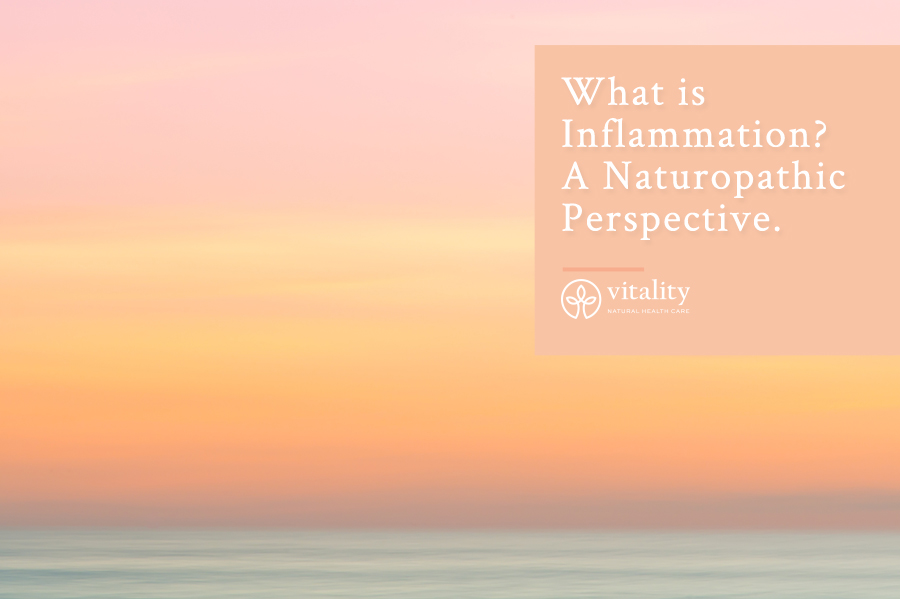It seems like everyone on the internet is talking about inflammation, in the health and wellness space at least.
But what is inflammation, and why is there suddenly so much conversation about it on social media and various health and wellness blogs?
From a naturopathic perspective, inflammation is the body’s natural response to injury and toxin exposure, like viruses and bacteria. It is the body’s way of kickstarting the healing process and getting rid of toxins.
There are two types of inflammation:
External – this may occur when you stub a toe or break a bone. When these things occur, the immune system activates, accesses the situation, and sends white blood cells to the affected area. This increase in blood flow to the affected area generates heat. It can also make the area of injury visibly red. Additionally, the white blood cells contain neutrophils and leukocytes, these help to eliminate bacteria and protect the damaged tissue from infection.
As you can see, external inflammation, in this case, is actually a good thing. It’s a sign that your body has begun the healing process!
You can support this process by using RICE (not the grain, but the process!):
- Rest
- Ice
- Compress
- Elevate
Internal – inflammation of organs and tissues inside the body. This occurs in response to illness, like viral and bacterial infections.
Internal inflammation is not limited to one area of the body but can occur in any organ or tissue. You may experience swelling or redness in your throat when you have strep throat, your sinus may become inflamed when you have a sinus infection. The area it occurs varies based on where the bacteria or virus resides in the body.
Internal and external inflammation is classified as either acute or chronic –
Acute: starts quickly and generally resolves within a few days.
Chronic: when acute inflammation is not addressed, it becomes chronic, lasting for months or even years.
Chronic infections are harder to treat and take a much longer time to heal from, so it’s important to address inflammation and illness when it happens – before it develops into autoimmune disorders, like lupus, hashimotos, and rheumatoid arthritis; or other serious conditions, like heart disease.
How do you know if you are inflamed?
External inflammation is typically visible – you’ll see swelling and redness in the area of injury. You may also feel heat and pain in this area. Internal can be detected similarly, with pain and sometimes visible redness. However, in most cases, internal inflammation needs to be accessed through testing.
The tests I perform most frequently to diagnose inflammation are:
High Sensitivity C-Reactive Protein (CRP):
CRP is a protein made by your liver. It is sent into your bloodstream in response to inflammation. Your levels of CRP should be less than 1.
Levels higher than this are a sign of inflammation. For instance, patients with pneumonia, asthma, ear infections, and urinary tract infections often have CRP levels ranging from 30-100. The higher the number, the more inflammation there is in your body.
This test is so important that I order it for my patients 2-3 times each year.
Erythrocyte Sedimentation Rate (ESR)
This urine test is not often covered by insurance but is a test I order for patients when necessary to monitor internal inflammation. It is especially helpful when diagnosing and treating autoimmune conditions, like lupus and Grave’s disease; as well as inflammatory diseases, like arthritis.
Treating Inflammation
Of course, the treatment for internal inflammation and external inflammation varies based on the individual and the condition, but there are some things that you can do on your own to help keep your levels on inflammation low.
- Reduce and manage stress
Chronic stress is one of the most common causes of inflammation. We are a society on the go, which doesn’t allow much time for our bodies to recuperate and heal. However, chronic stress can lead to inflammatory conditions like migraines, irritable bowel syndrome, eczema, and heart disease, so it’s important to make time to rest and decompress. You can also try one of my favorite meditations. - Eat calming foods
Incorporate lots of green leafy vegetables, ginger, turmeric, onions, and garlic into your diet. These will help to reduce inflammation. At the same time, you’ll want to eliminate inflammatory foods, like gluten, sugar, processed and packaged foods, hydrogenated oils, alcohol, and MSG. A few of my favorite anti-inflammatory foods are bone broth and a cooling juice with spinach, collard greens, green apple, and celery. Not only will the green juice cool your body and reduce heat production, but it will also keep you well hydrated, which is essential for keeping inflammation levels in check. - Take Supplements
The supplements I regularly recommend for inflammation are:
DeFlam Support – this contains curcumin, a phytochemical obtained from turmeric. It is well-known for its anti-inflammatory properties. It also contains black pepper extract for optimal absorption and results.
Omega 3’s – fish oil contains omega-3 fatty acids, which is associated with lower levels of inflammation.
Body Renew Complete – this supplement supports your body’s natural detoxification process and strengthens the gut, resulting in a strong immune system and ability to fight disease and reduce inflammation.
Pro-Enzyme – proteolytic enzymes help your body to heal and recover from tissue damage related to an injury.
In addition to these recommendations, I also recommend acupuncture, IV therapies and spending time in the sauna. I discuss the benefits of each of these here.
Of course, if the inflammation is really severe, I may also recommend a 5-day course of anti-inflammatory medication. In contrast to many western medicine practitioners, I do not recommend or offer this as a long term solution. In my medical opinion, it is an option best used as a short-term option to quickly reduce any inflammation present, then modulate long-term with natural remedies.
When we constantly depend on medications to reduce inflammation, internal or external, we can become dependent and weaken our immune system over time.
This blog post was a bit longer than many of the ones I’ve written in the past, but I think a topic like inflammation lends itself to a more in-depth presentation.
To that end, I’ll be sharing my naturopathic perspective on inflammation for the rest of the month. We’ll talk about inflammatory hormones, sleep, and I’ll also dive deeper into treatment with a patient case study. I hope you’ll stick around! And if you find this information helpful, share it with your friends.
We all experience inflammation to some extent in our lifetimes and knowing how to remedy it is of the utmost importance if we want to prevent chronic disease.
xo,


